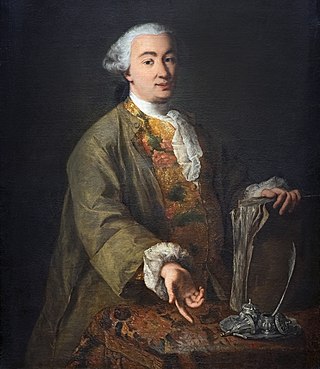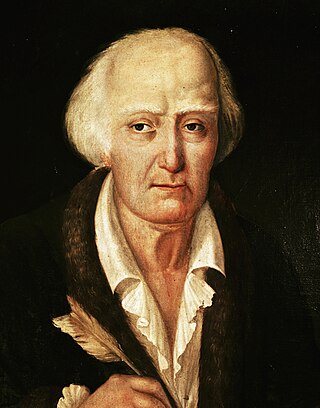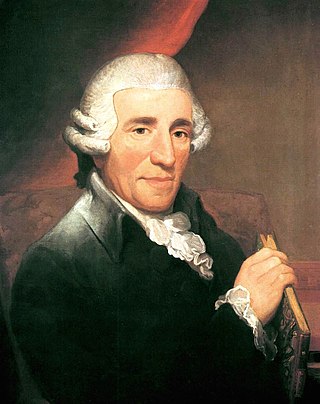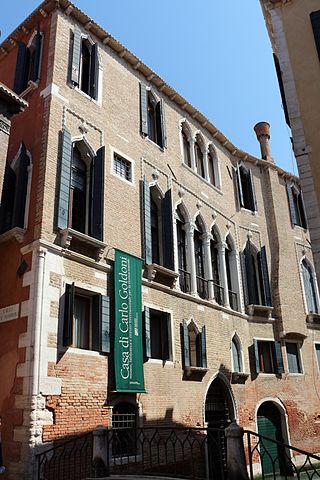
Carlo Osvaldo Goldoni was an Italian playwright and librettist from the Republic of Venice. His works include some of Italy's most famous and best-loved plays. Audiences have admired the plays of Goldoni for their ingenious mix of wit and honesty. His plays offered his contemporaries images of themselves, often dramatizing the lives, values, and conflicts of the emerging middle classes. Though he wrote in French and Italian, his plays make rich use of the Venetian language, regional vernacular, and colloquialisms. Goldoni also wrote under the pen name and title Polisseno Fegeio, Pastor Arcade, which he claimed in his memoirs the "Arcadians of Rome" bestowed on him.

Carlo, Count Gozzi was an Italian (Venetian) playwright and champion of Commedia dell'arte.

Marco Marazzoli was an Italian priest and Baroque music composer.

Gli amori d'Apollo e di Dafne is an opera by the Italian composer Francesco Cavalli. It was Cavalli's second operatic work and was premiered at the Teatro San Cassiano, Venice during the Carnival season of 1640. The libretto is by Giovanni Francesco Busenello and is based on the story of the god Apollo's love for the nymph Daphne as told in Ovid's Metamorphoses.
Giovanni Battista Bassani was an Italian composer, violinist, and organist.
Domenico Fischietti (1725–1810) was an Italian composer.

Andrea Maffei was an Italian poet, translator and librettist. He was born in Molina di Ledro, Trentino. A follower of Vincenzo Monti, he formed part of the 19th-century Italian classicist literary culture. Gaining laurea in jurisprudence, he moved for some years to Verona, then to Venice and finally to Milan, where in 1831 he married contessa Clara Spinelli. They separated by mutual consent on 15 June 1846.

Vincenzo Pucitta was a nineteenth-century Italian composer. Born in Civitavecchia, he wrote more than 20 operas during his career. One of his works, La Vestale, after its premiere in London (1810), was also sung in Lisbon (1816), Milan (1816) and Rio de Janeiro (1817). He died in Milan.

Giovanni Marco Rutini was an Italian composer.
Gennaro Astarita was an Italian composer, mainly of operas. The place of his birth is unknown, although he was active in Naples for many years. He began his operatic career in 1765, collaborating with Niccolò Piccinni in the writing of the opera L'orfana insidiata. He became the maestro di cappella in Naples in 1770.
Marcello Bernardini was an Italian composer and librettist. Little is known of him, save that he wrote 37 operas in his career. His father was most likely the composer Rinaldo di Capua.

Giacomo Domenico Mario Antonio Pasquale Giuseppe Tritto was an Italian composer, known primarily for his fifty-four operas. He was born in Altamura, and studied in Naples; among his teachers were Nicola Fago, Girolamo Abos, and Pasquale Cafaro. Amongst his pupils were the young Vincenzo Bellini around 1821, plus Ferdinando Orlandi. He died in Naples.

Le pescatrici Hob. 28/4, is an opera in three acts by Joseph Haydn set to a libretto by Carlo Goldoni. Originally composed as part of the wedding celebrations of Maria Theresa Countess Lamberg, the opera was first performed on 16 September 1770 in the court theatre at Eszterháza.

Antonio Buzzolla was an Italian composer and conductor. A native of Adria, he studied in Venice, and later worked with Gaetano Donizetti and Saverio Mercadante. He composed five operas, but was better known in his lifetime for ariettas and canzonettas in the Venetian dialect. Beginning in 1855 he served as the maestro di cappella of the Cappella Marciana at St Mark's Basilica in Venice. Buzzolla was one of the composers invited by Giuseppe Verdi to contribute to the Messa per Rossini; he composed the opening movement, the Requiem e Kyrie. He died in Venice in 1871 and was interred at the San Michele cemetery on the Isola di San Michele in Venice.

The House of Carlo Goldoni, or in Italian, Casa di Carlo Goldoni is writer's house museum located in a small palace or palazzetto, that served as the residence of the Italian playwright Carlo Goldoni. Located in San Polo, Venice, it is now a museum and library of theater studies.

Camillo Migliori, best known as Camillo Milli was an Italian stage, film and television actor.
Antonio Simeone Sografi, also known as Antonio Simon, or just Antonio, was an Italian librettist and playwright.

Elsa Vazzoler was an Italian stage, film, television and voice actress.












